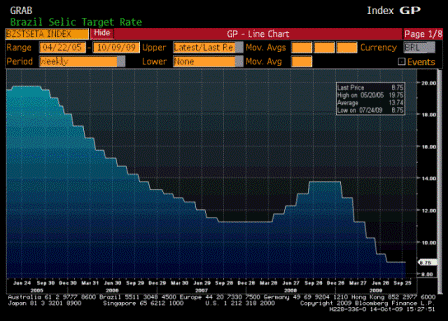[Skip to the end]
Rates high, deficit up, state sponsored lending that’s functionally a fiscal transfer more than making up for the drop in private sector lending.
Looks good!
Brazil:
Rates: Currently at 8.75%. Down from cycle high of 13.75% in January 2009.


Deficit: Currently at 3.4% of GDP. Largest since December 2006.


Brazilian Development Bank Lending has been instrumental in increasing credit.
In May 2009, the government also lowered to a record 6 percent the long-term interest rate charged by the BNDES state development bank for lending that, with private credit tight, it plans to expand 30 percent to 120 billion reais ($70 bln) this year.
Total domestic credit has grown 21% y/y as of July
Private sector bank lending has fallen 11% y/y
Public sector bank lending has jumped 40% y/y.
Foreign Direct Investment fell off sharply in 2009 and should return roughly to 2007 levels in 2010.


[top]




